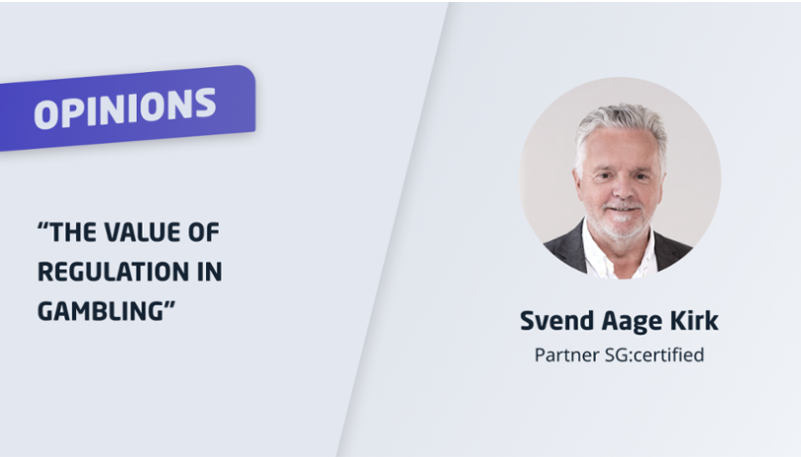AML from A to C. Assessment to Compliance.

AML from A to C. Assessment to Compliance.
AML from A to C. Assessment to Compliance.
SG:certified and Crucial Compliance, two gambling compliance heavyweights, have joined forces to create a package to support companies on AML. It starts with an assessment of a company’s practices and includes an educational program surrounding anti-money laundering (AML) training. It draws on the most up-to-date research and established best practices from regulated jurisdictions in an effort to raise the standards of AML prevention and detection worldwide.
“At SG:certified we are passionate about working collaboratively with others to make the gambling industry a safer and more sustainable place. Crucial Compliance is a company with a similar mission, so it was an ideal fit for us to partner with to create a training and assessment programme.” Vanessa Simpson, Communications Director, SG:certified.
While the average gambling customer is unlikely to give even a passing thought to money laundering as they take to the digital tables, combating financial crimes is among the foundational pillars of regulation. It is, in fact, one of the primary reasons gambling is a regulated product to begin with.
Why is AML so important in regulated gambling?
The purpose of AML regulations is fairly self-evident. They’re designed to address money laundering, that is: the passing of illegitimate funds through a legitimate business in order to conceal its true origin.
Money laundering is commonly associated with high-level organized crime and terrorism, and combating this illegal tactic requires diligent oversight. Estimates suggest as much as $2 trillion is laundered internationally each year, representing some 5% of all GDP worldwide.
Money laundering is a serious consideration for almost any industry that sees a lot of money flowing through it, and gambling is no exception. It is, in fact, a particularly high-risk industry for financial crime given the relative speed and frequency of large transactions and the lack of regulatory oversight in some locales.
From a practical standpoint, AML compliance is a critical component of license conditions and codes of practice (LCCP) for operators in every regulated jurisdiction. Money-laundering fines for the banking industry can reach into the billions of dollars, and penalties for payment processors and gambling operators put AML failures among the costliest of all regulatory infractions.
When it comes to disrupting organized crime and terrorism, the stakes couldn’t be higher.
There is, however, some good news. The fact that gambling is so strictly regulated means that AML controls are widely available and highly refined, and their implementation is among the most standardized of all operational requirements. Still, there is some work to be done.
Collaboration and innovation in AML compliance
As with most compliance matters, the quality of AML efforts comes down to how well the rules are written, followed, and enforced. And staying one step ahead of the bad actors requires a coordinated effort from researchers, regulators, payment providers, product developers, independent auditors, and every employee with a customer-facing role. Mitigating financial crime is a tough task.
Despite near-universal requirements for annual AML training, there is often a significant gap between education and execution in the real world. This game of cops and robbers continues to evolve in the digital era, and the existing training programs for AML compliance are often too generic and too forgettable to translate into real success. In too many cases, they’re just another box to tick.
Companies like Crucial Compliance and SG:certified have worked to fill that gap with their own educational workshops and practical training modules rooted in the newest research, and the notion of collaborative compliance is central to their new partnership.
“It’s exciting to work with SG:certified to develop an assessment and training program that is fit for purpose and truly designed to meet the ever-changing needs of the industry,” said Sonia Wasowska, Regulatory Compliance Consultant for Crucial Compliance. “Our teams are unified in our desire to foster a community of like-minded compliance and ESG professionals who rely on research and data to improve the delivery and execution of safer-gambling programs worldwide.”
The jointly developed program endeavors to help regulated gambling companies foster trust with their customers, maintain their operational integrity, and combat financial crime. The AML training from Crucial Compliance is now available here
Category
Other Blogs

October 12, 2023
EveryMatrix Case Study

August 30, 2023
The value of regulation in gambling

August 22, 2023
Chumash Casino Resort - Case Study

August 11, 2023
The markers of gambling-related harm in poker and beyond

May 30, 2025
G4 Partners with SGcertified to Strengthen Auditing Services in Responsible Gambling

May 16, 2025
Nueva reglamentación publicitaria en España

January 20, 2025
The Importance of Accreditation with Lottopar

January 16, 2025
Insights on Anti-Money Laundering (AML) and the Didier Reynders case


